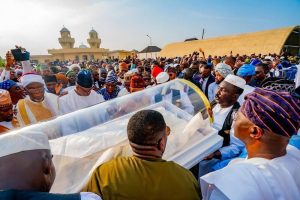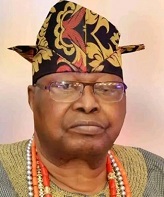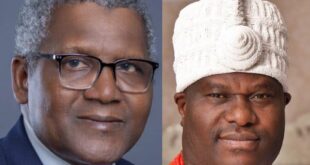BY IDOWU HAMED
“Why I Championed the Rights of Obas to Be Buried According to Their Faith” – Awùjalè
IJEBU-ODE, OGUN STATE, NIGERIA – Observers have continued to weigh in on the controversy surrounding the burial of the late Oba Sikiru Kayode Adetona, GCON, the Awùjalè of Ijebu and Paramount Ruler of Ijebuland, in line with his religious beliefs.
Many argue that the public outcry stems largely from a lack of awareness about the constitutional and traditional reforms that backed the development.
According to a vox pop conducted by StarTrend Int’l Magazine and Online Platform across several South-West states in Nigeria, most respondents – who requested anonymity – expressed the view that, “It is important to remember: no Oba in Ogun State is crowned today without the approval of the government. That fact alone legitimizes the newly implemented burial law.”
They recalled that, in the past, traditionally, the selection and coronation of an Oba were exclusively the responsibility of the kingmakers, carried out without government interference.
“But times have changed,” one respondent noted. “And when these changes began, no one raised any objection.
“Even when the policy permitting Obas to be buried according to their religious beliefs was introduced in Ogun State, there was no legal challenge. Now that it’s being enforced, the time for protest has passed.”
Another observer added pointedly, “There’s no point crying over spilled milk. ‘Ada gé ọmọ lọwọ, ó sọ̀ nù’ – the cutlass has already done its worst.”
They concluded with a rhetorical question, “With all this in view, must we still continue to flog the issue of Oba Adetona’s burial wishes?”
Against this backdrop, the late Oba Sikiru Kayode Adetona, GCON, during his lifetime, had boldly championed the right of Obas to be buried according to their faith.
It was a forward-thinking stance, grounded in reason, human dignity, and constitutional order.
In his autobiography (Pages 212–214), the revered monarch explained, “No matter is too small, large, or sacred that we cannot discuss and reach a decision upon. A clear example is the burial of Obas.”
He recounted the troubling customs of the past, including the sacrifice of the Eketa Odi – the Oba’s closest personal servant – upon the monarch’s death.
This servant’s life was tied to the Oba’s as a sign of absolute loyalty. When the Oba died, the Eketa Odi followed.
“The Odis, who were essentially slaves, took charge of the Oba’s corpse. They vented their bitterness on the body, sometimes mutilating it. That became the custom”, he wrote.
But Oba Adetona viewed this as inhumane and archaic. “Although this treatment of an Oba might have been accepted in the past, I thought it was barbaric to retain it. It is people who create traditions. And in the interest of the community, traditions that no longer fit into the modern age should be discarded.”
He emphasized that tradition must be dynamic, not stagnant, and that practices rooted in slavery and violence had no place in modern society.
In 1980, Oba Adetona opened formal discussions with the Ijebu Traditional Council, leading to a landmark resolution on 28 May 1980: from that point forward, Obas in Ijebuland were to be buried in accordance with their religious beliefs, without prejudice to any traditional gifts or rites that do not compromise human dignity.
Still, misperceptions persisted. To further entrench the new standard, a larger meeting was convened 17 years later, on March 31, 1997, at the Aafin. Over 2,000 stakeholders attended – including Obas, Otunbas, Chiefs, Bishops, Imams, Òṣùgbós, Pámpas, Ìlámùréns, scholars, and representatives from various Ijebu communities.
They concluded that – Obas should be buried according to their religious beliefs, personal wishes, or family decisions.
Also, Children of Obas should be allowed to perform memorial services or hold social ceremonies after the Oba’s passing.
These resolutions marked a significant modernization of the traditional system.
Despite these reforms, some families continued to face harassment following the death of an Oba – more often out of a desire for extortion than tradition.
In other cases, the family of a deceased Oba, due to lack of funds, abandoned burial responsibilities to the community.
To address this, Oba Adetona proposed a pragmatic solution, “The Local Government or the State Government should statutorily make specified funds available for the burial of an Oba. We must not go back to the past.”

In his eyes, an Oba was far more than a traditional ruler – he was a symbol of unity and continuity, a rallying point for the people.
By advocating for dignity in life and death, Oba Adetona worked to ensure that the institution of Obaship would remain honorable and inviting to good, upright individuals.
Oba Sikiru Kayode Adetona, GCON, was not only a monarch of deep wisdom, but also a reformer who courageously confronted and transformed outdated traditions.
His legacy is one of bold leadership, humane governance, and a clear vision for a modern, respected institution of royalty.
 Startrend International Magazine For Your Latest News And Entertainment Gists
Startrend International Magazine For Your Latest News And Entertainment Gists





